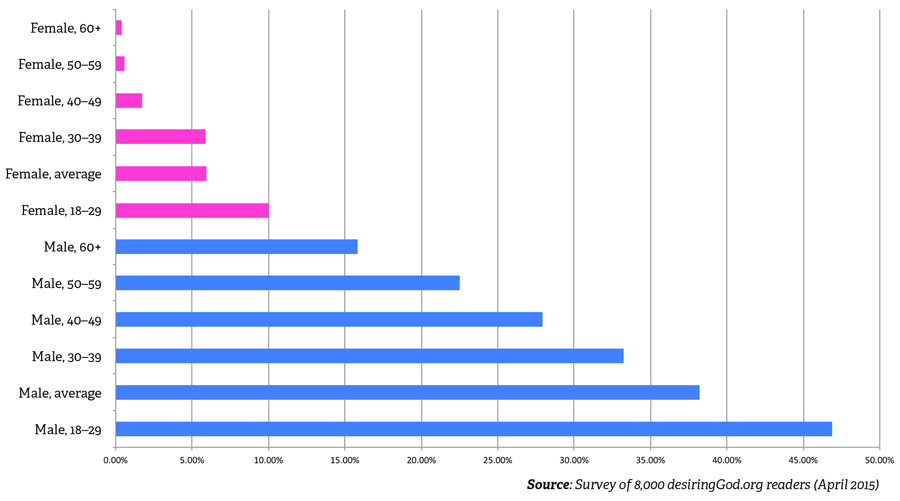Last year, we surveyed 8,000 Desiring God readers. The study revealed that pornography usage is higher among younger adults than their older counterparts. David Mathis sums up our findings:
More than 15 percent of Christian men over age 60 admitted to ongoing use. It was more than 20 percent for men in their 50s, 25 percent for men in their 40s and 30 percent for men in their 30s. But nearly 50 percent of self-professing Christian men, ages 18–29, acknowledged ongoing use of porn. (The survey found a similar trend among women, but in lesser proportions: 10 percent of females, ages 18–29; 5 percent in their 30s; increasingly less for 40s, 50s, and 60-plus.)
Sexual sin is one of the greatest threats to thriving and vibrant Christian living. Many Christians, especially young singles, are discouraged and defeated in their fight to overcome sexual sin.
Many are so overwhelmed they simply give up for a season. They give in to their sin, stop reading their Bibles, stop sharing the gospel and eventually stop attending corporate worship. Some come back, but many don’t because they can’t imagine a God who is faithful and just and willing to cleanse them of all unrighteousness. Others simply stop believing in God altogether or create a god that approves of their sinful lifestyle.
Christians who struggle with sexual sin begin to fear that Christianity has nothing to offer but bad news—guilt and shame. Whether the struggle is with homosexuality, fornication or pornography, many feel helpless in the fight to kill their sin. They don’t know how to deal with the guilt and shame. They feel unsafe around Christians and struggle to see anything good about the gospel we present, especially when the grace of the gospel is not highlighted or lived out.
I recently spoke with Rosaria Butterfield, someone who has thought and written a lot about this subject. She reiterates that the “gospel is good news for sinners and, quite frankly, there is no gospel for people who think they are all cleaned up just the way they are.”
If someone thinks he is doing pretty good and doesn’t have a sexual sin issue, she says she is more worried for that person than anybody. The gospel isn’t good news so that we can have a carefree life.
“The point of the gospel is to so fully reshape and remake us to reflect the image of our Savior that we are fit to inherit a New Jerusalem with him. And in that New Jerusalem, there is absolutely no category called ‘sexual orientation.’ There are two things that will survive into the New Jerusalem: the souls of people and the word of God.”
Rosaria is concerned about how easily personhood is conflated with struggle. The current trend is to define people by their besetting sins. Typically, people who struggle with laziness, gluttony, pride or sexual immorality define themselves by whatever they struggle with. They often say, “This is just the way I am. I’m just a [fill in the blank] person.” This gives them a false sense of peace, justification and righteousness. They have peace because they think they’ve accepted themselves for who they truly are. They feel justified and righteous because now the sin is no longer a bad thing but a personality trait—the way they were born.













